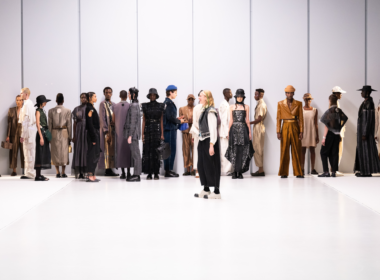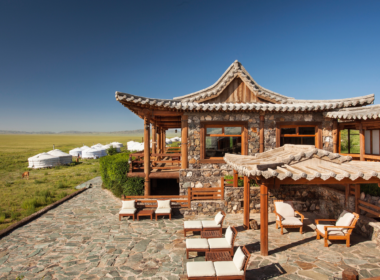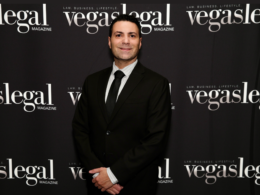For Monika Mandac, fashion is not merely a vocation; it’s a form of expression, a medium through which she channels her deepest thoughts and emotions. Her works embody a language of feminism, gender fluidity, and societal commentary. Through constructivism and deconstructivism, she explores the interplay between raw elements and refined beauty. In this exclusive chat with Fabl’style, Monika Mandac candidly shares her views on societal perceptions, the pressure on fashion students, and her approach to sustainability—a balance between artistic experimentation and mindful consumption.
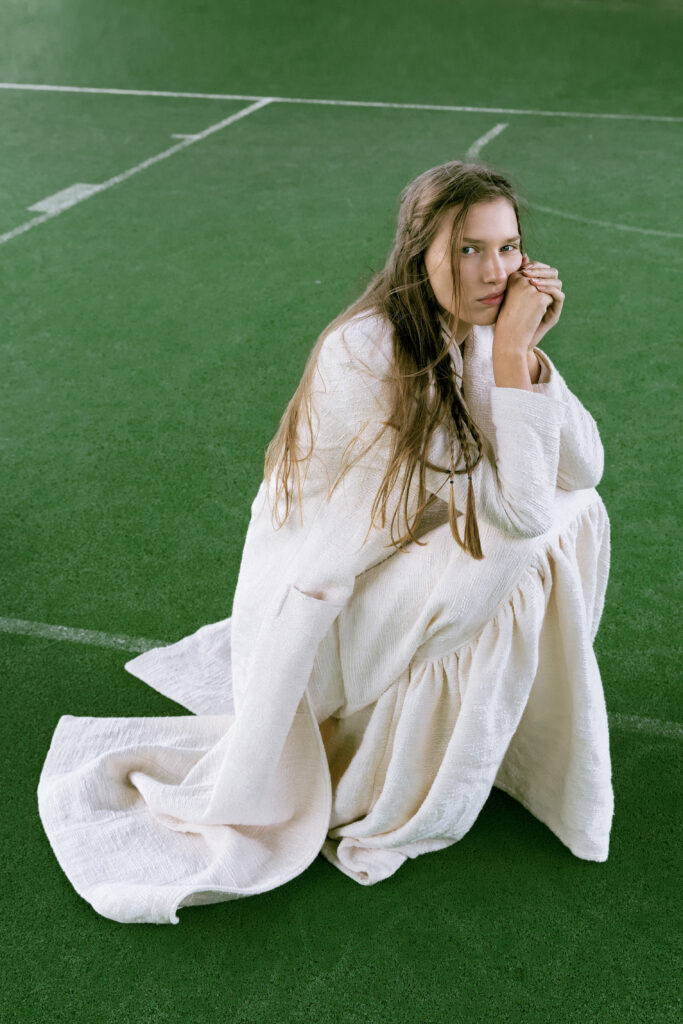
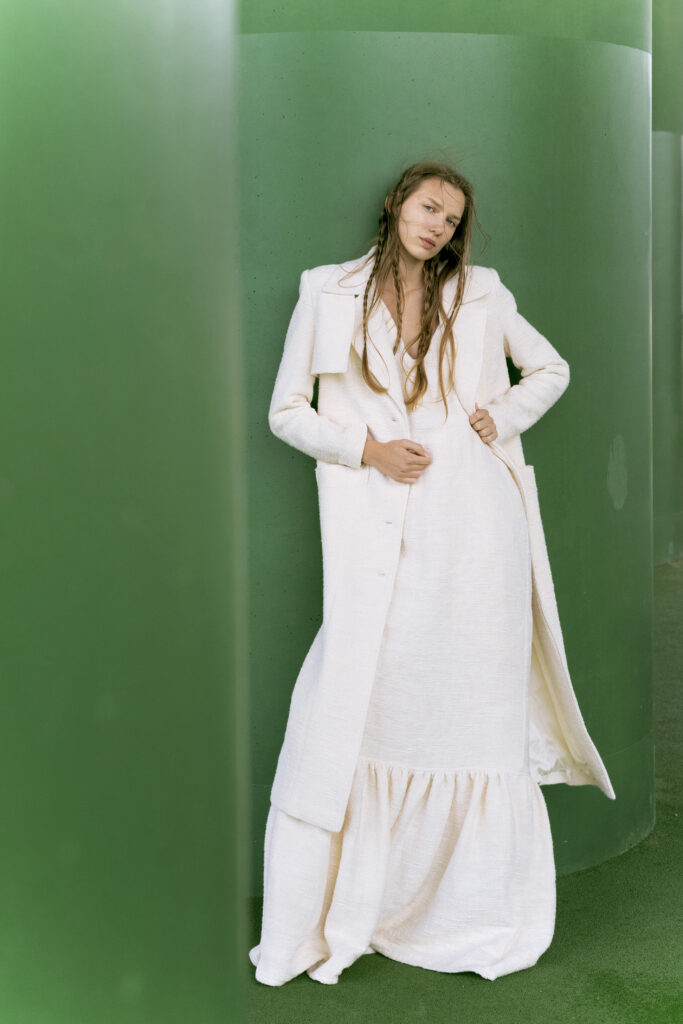
A Brush with Destiny
FAB: What’s your story?
Monika Mandac: I am from a small village in Serbia, but I was raised in Slovakia, and my nationality is Slovakian. Since I was little, I’ve always loved art and experimenting with different techniques. My family knew about my passion for art, but neither they nor I initially anticipated a career in fashion. However, everything changed in seventh grade when our history club invited a cousin of our professor, who was studying fashion in Slovakia. Learning about her studies opened my eyes to the possibility of pursuing fashion design, and from that moment on, I was determined to pursue this path. By then, I had already started doing sketches, but I didn’t know there was the possibility of studying fashion design. I was just fourteen when I knew I was going to do that.
I enrolled in a high school of design in Serbia, where I focused on textiles. It was also pretty funny because I also just knew it was textiles I wanted to study. I went there with my mom. I had to do a talent test—drawing and other tasks. You either get in or you don’t. The first thing was that we had to write about ourselves, our names, and where we were from. There was this part where you needed to choose a field of study, and I just wrote textile. Then, a professor came and was like, “You need to fill all of these,” but I told him I just wanted to go to textile. Then he said, “But you don’t know if you’ll get in; you need to fill it just in case.” I insisted that I wasn’t going to fill anything else in because I already knew what I wanted. We argued, and I blurted out that I didn’t even know there were other courses available and that I just knew I wanted to study textiles. It was really funny, but I really didn’t know what the other courses were. He told me, and then I filled them in. It was really funny, but I got in.
When I started high school, I didn’t have a clear vision of my future career path. However, with the support of my professors and peers, I began preparing for university admissions. There was again a really funny situation. I was with my boyfriend and his friends; we were sitting in a restaurant, and his friends started asking me questions. They asked if I was prepared for the exam I would be having in two days, and I said yes. And then he said, “If you don’t get in, what are you going to do?” I replied, “I’m getting in.” He asked again, and I gave the same reply. I had just one vision. After that, I started realising that I had never thought about another option. It was just always one for me. It was crazy just to go for one dream. After months of preparation, I successfully passed the talent test and secured admission to the university. I studied there for six years until I finished my master’s degree.
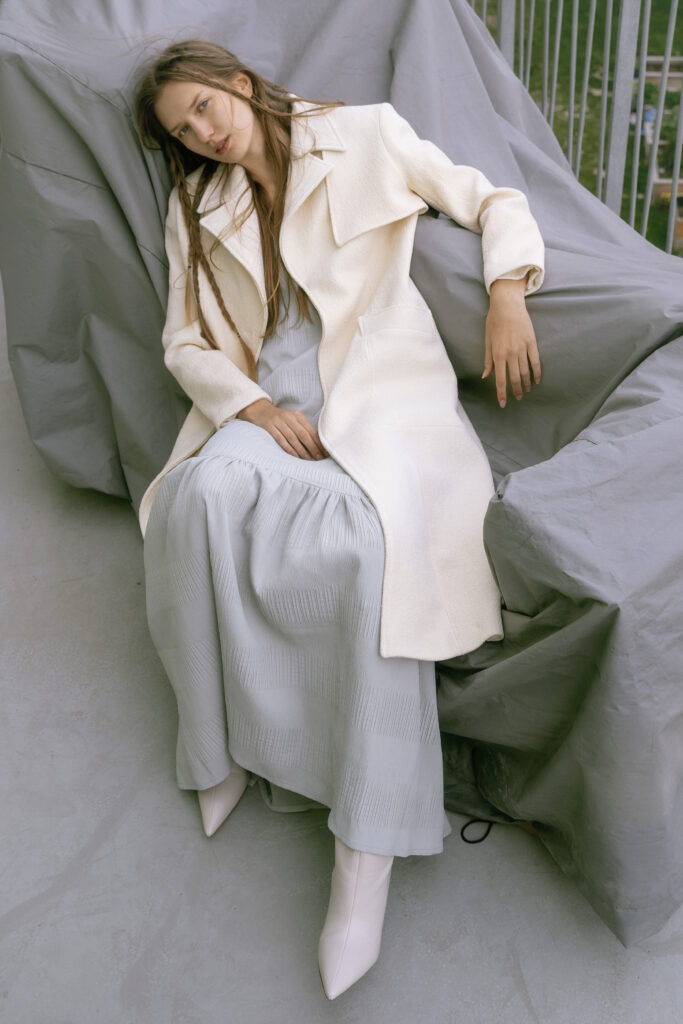
During my university years, I had the opportunity to participate in an exchange programme in Nottingham and complete an internship in Venice, albeit under unusual circumstances due to the COVID-19 pandemic. Despite the challenges, these experiences broadened my perspective and honed my skills.
Following my internship, I unexpectedly found myself with free time due to lockdown restrictions. This led me to reach out to a designer whose work I admired, seeking an internship opportunity. To my surprise, he offered me a position, which turned into a transformative two-year learning experience.
When we finally finished everything, I sat down with him, and that was the first time in my life that I would really sit down to think about my next step. I didn’t have time during the last semester to even think about what I would do after university. We sat down, we had a conversation, and I just wanted to ask him questions. I asked him, as my mentor and my friend, to tell me what he really thought about my collection. He just told me that they were really good and they had potential, and that I just had to make up my mind. I started thinking really soon about the applications for Fashion Live here. I didn’t even want to go. I was helping him prepare for Prague fashion week. I remember that I was just sitting on the couch and sewing a million buttons, and he just turned to me and asked, “Are you going to fashion live?” I said no. He told me to go, but I didn’t want to. It took about twenty minutes for him to persuade me, but I am grateful that he was able to.
It’s really hard to identify your identity as a student. You’re working for yourself, and you have this crazy schedule, but it’s also very flexible, and it’s like you can manage a million things at once, but no one actually prepares you for that moment when you finish this half of your life. You just have to get your grip together and start doing something. It’s a crazy moment in life. Basically, I thought that when you finish university, you just continue on some road, but then you realise that you’re just starting from the beginning.
FAB: You are an irredeemable optimist.
Monika Mandac: Sometimes I look back and can’t believe those things really happened. My mom was really cool through those periods. She always taught me from childhood to always have confidence in myself and to be mindful of what I say and do because words are really powerful. She was really helpful and supportive. It really helped to have a very inspiring mother who’s always positive in situations.
The Artistic Awakening
FAB: Let’s go into the feminist aspect of your work. What message do you hope to convey about gender equality through your work?
Monika Mandac: It’s not just feminism per se that I just like to put my point at, but it’s also gender fluidity and balancing everything. When I started doing my master’s collection, I actually wrote works about constructivism and deconstructivism because I have always loved deconstruction. It has always pulled me, and I’ve always loved the raw part. These may be dark things that you can make into more beautiful things by embracing something that isn’t perfect. For me, it’s just this thing that both guys and girls can work with their own bodies to cover and uncover it as much as they want to. Most of the things that I make are unisex because I really love the idea of everybody being able to wear one thing, either in different sizes or with different styling. I think clothing has a really big say in this. When you take one piece of clothing that everyone can wear, it’s just amazing. Also, femininity lies in that. You don’t have to expose yourself or meet these criteria that women have always had to meet, but you can just choose your own.
For me, it’s like a puzzle that I am trying to work on all the time, and I just think about how we as people are portrayed in society. I really like to dabble in this and just find a balance. Even when I was just trying to go through what deconstruction is, it always had to have construction. To deconstruct something, it has to be constructed first. It’s really amazing that it makes some kind of circle, and you can just play with it and find something new every time. You can explore it over and over. I think it’s something I’m going to work on for a little longer because it is really interesting to me.
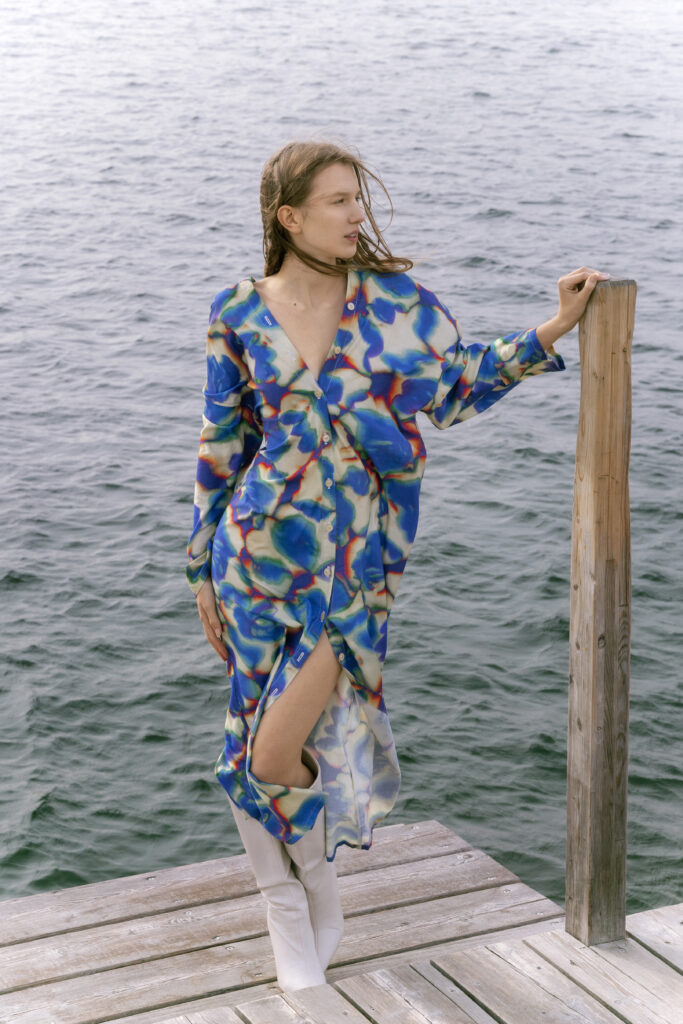
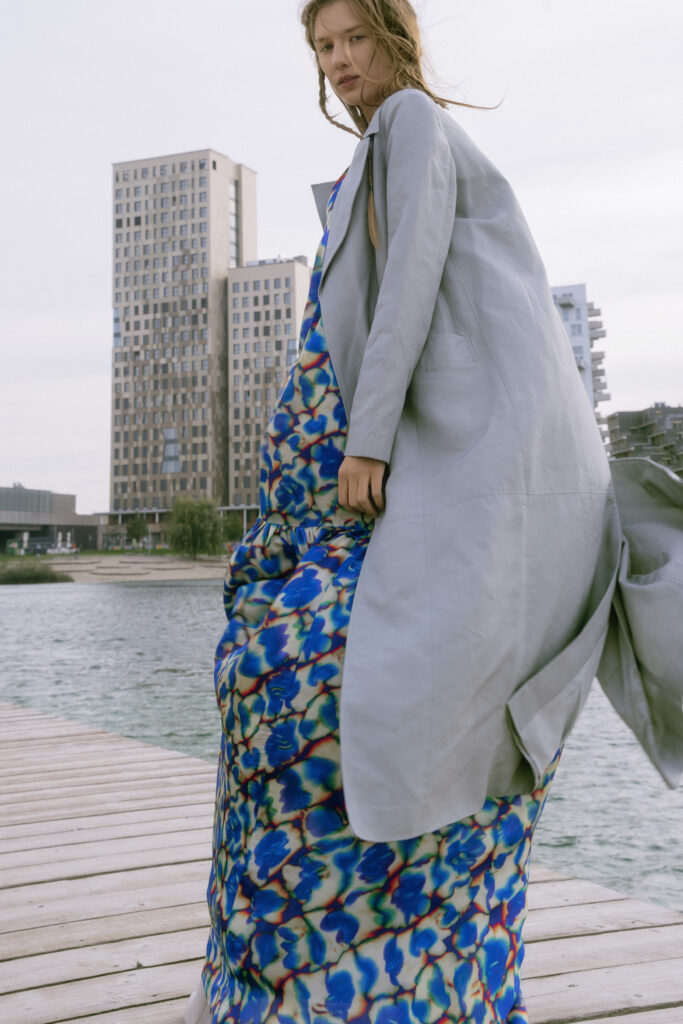
Monika Mandac on The Path Less Traveled
FAB: How do you incorporate eco-friendly practices into your work, from material to production?
Monika Mandac: When it comes to this, I think, first, that clothing design is not one of the biggest polluters, and I don’t look at it like that. I really like to think of it as not being about me but about the people who buy these local designs. If they are sustainable, then I am sustainable with them. I think I am being very mindful when it comes to fabric. I buy most of my fabrics from deadstock, and I try to buy only as much as I need. I know that I am buying it for a purpose, so I don’t have any waste.
The second thing is, since I really like deconstruction, I really like to upcycle. If I have some waste materials, I like to combine them and upcycle them. My favourite thing to do is make hoodies. It’s pretty fun for me to make hoodies from waste fabrics that I have. Also, I may be a bit controversial when it comes to this. When it comes to fashion design students, for example, I think that there’s really big pressure. When we were studying about this, everyone was just telling us that it is really important to be mindful and to think about your production, but when it comes to local designers, I personally produce up to fifty pieces of clothing a year. It’s not as much.
I think there’s a really big pressure on students. I remember when we were studying and we had all these crazy exams and work, we would also be criticised about it, but for me, these few years should be like a safe space for these people so that they can experiment and work on their art and find what they want to do. I think that since we are aware of how everything is right now and we really need to be mindful of nature’s social climate, it comes naturally to most designers. I think there are a lot of ways you can be sustainable. I am trying as much as I can, but of course, everyone has to do more so that we can make change. I believe that using deadstock fabrics and upcycling are the little things that I can help with.
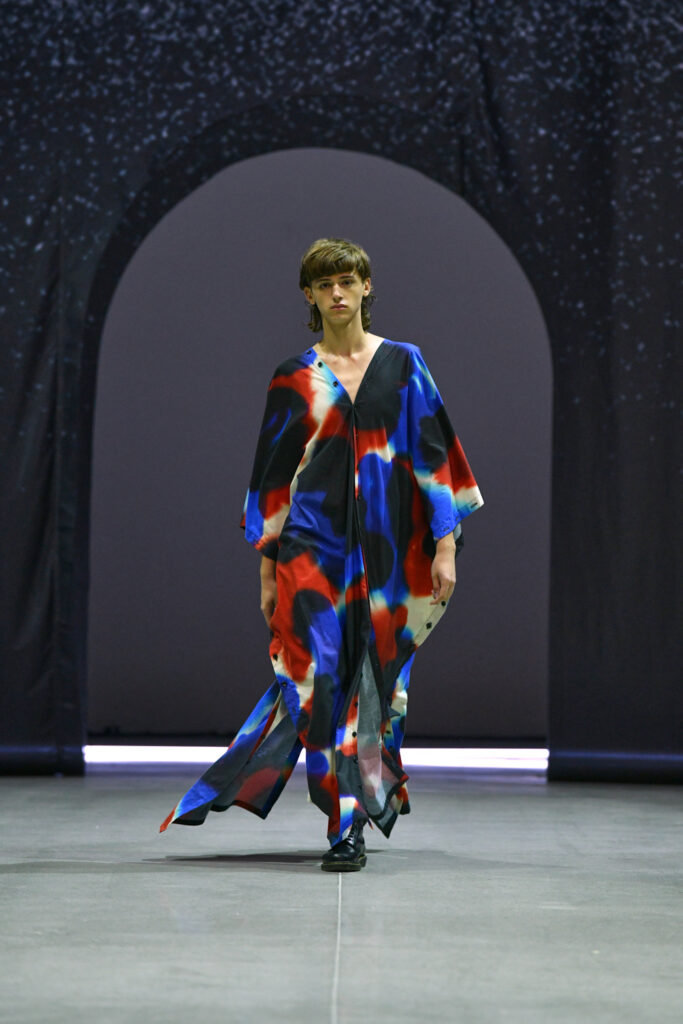
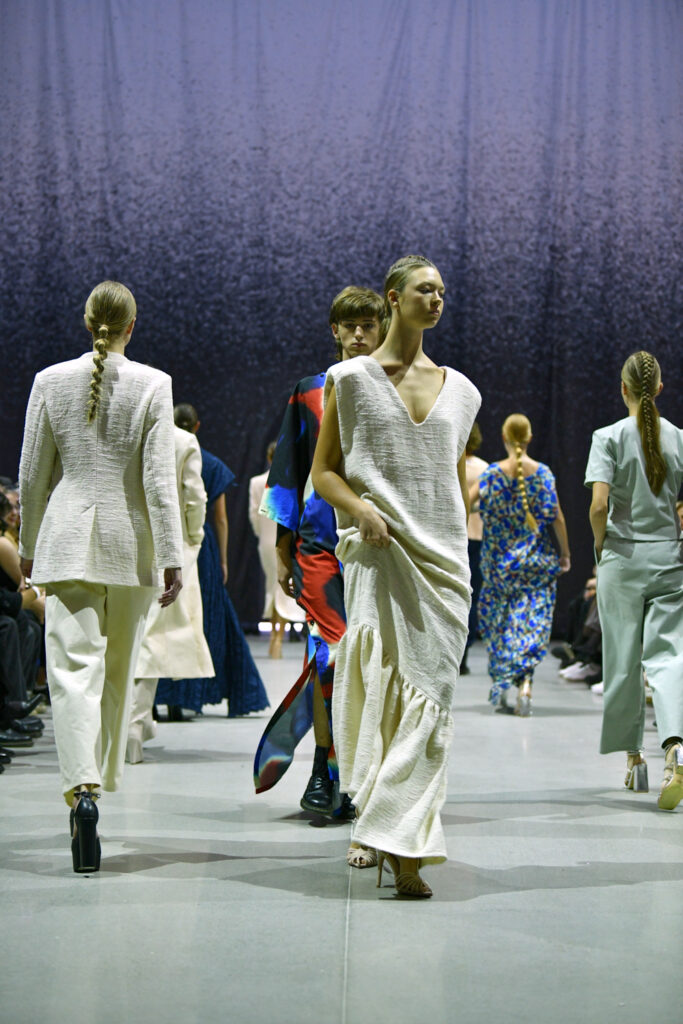
A Poetic Palette
FAB: Let’s explore the poetic aspect of your work. What’s your relationship with poetry?
Monika Mandac: It was a kind of habit from one of my works from university. It made me realise how hard it could be the first time I worked with a poem. It’s really quite hard, but I tried a few more times, and I did not really succeed. But I had this work in high school where I worked with a poem, Albatross. It was like my perception of society, and it was also where I started dabbling into construction and deconstruction because I had this outfit that you can layer. They were see-through materials. The more see-through material you put on your body, the more of your body you cover.
The poem Albatross is about a species of bird that is being hunted; they’ve been caged, tortured, and cut, and they didn’t survive. It created a connection for me in my artistic expression. The models had red tape, and when you put it over and made it really hard, the models couldn’t move in it. It was where I started to dabble in the whole deconstruction process, the idea of balancing in our society, and my thinking about my art and the construction of the clothes that I make. It was one of the starting projects.
FAB: How did you come into photography?
Monika Mandac: Photography has always been part of my life. My mom, grandmother, dad, and grandfather were all involved in photography. At about twelve, I got my first camera when my parents took me to an event and realised my talent. I started working as a second photographer at weddings, a role I continued until I left Serbia. In high school, I frequently did fashion shoots with my roommates. When I went to Slovakia for university, I took a break from photography but later resumed collaborations with fellow students. During my internship in Italy, I had limited opportunities for photography due to COVID-19 restrictions. However, I returned to photography about three or four years ago, finding renewed passion and purpose.
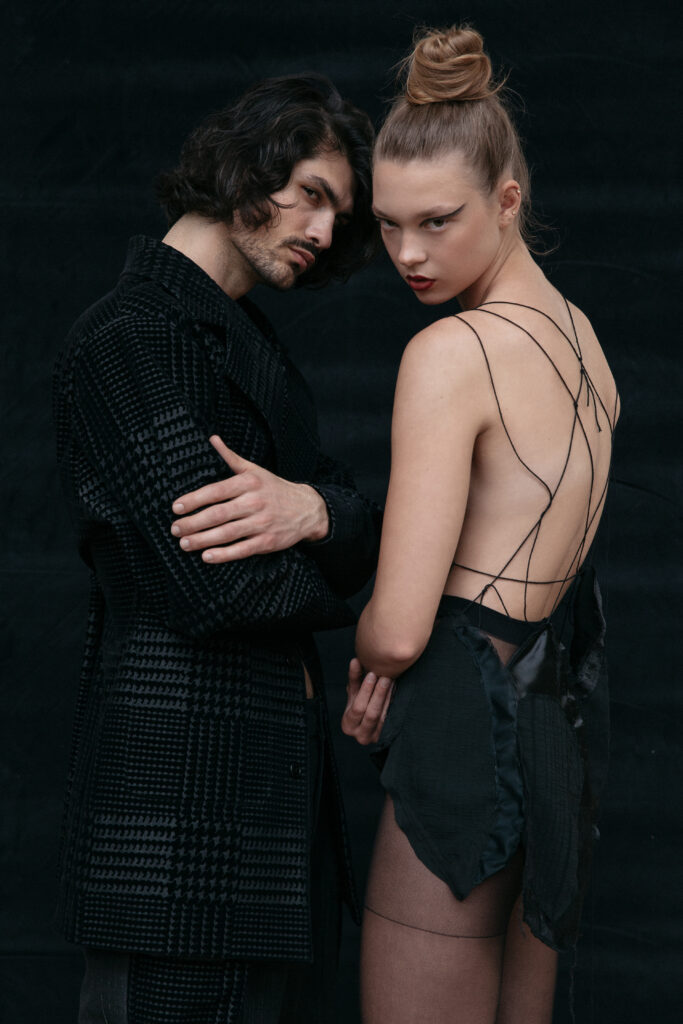
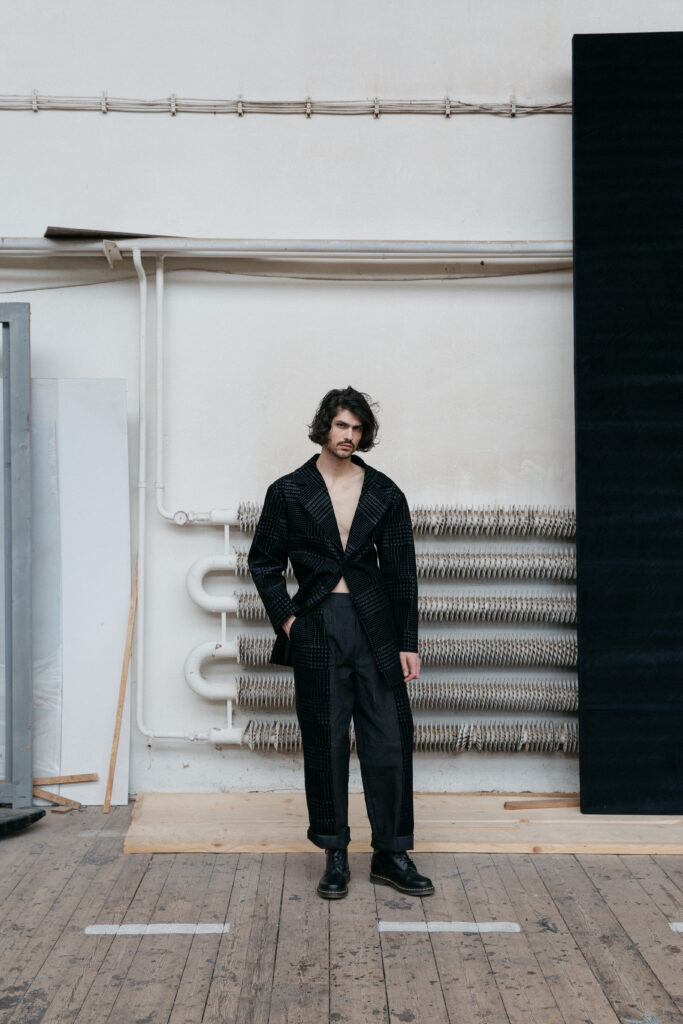
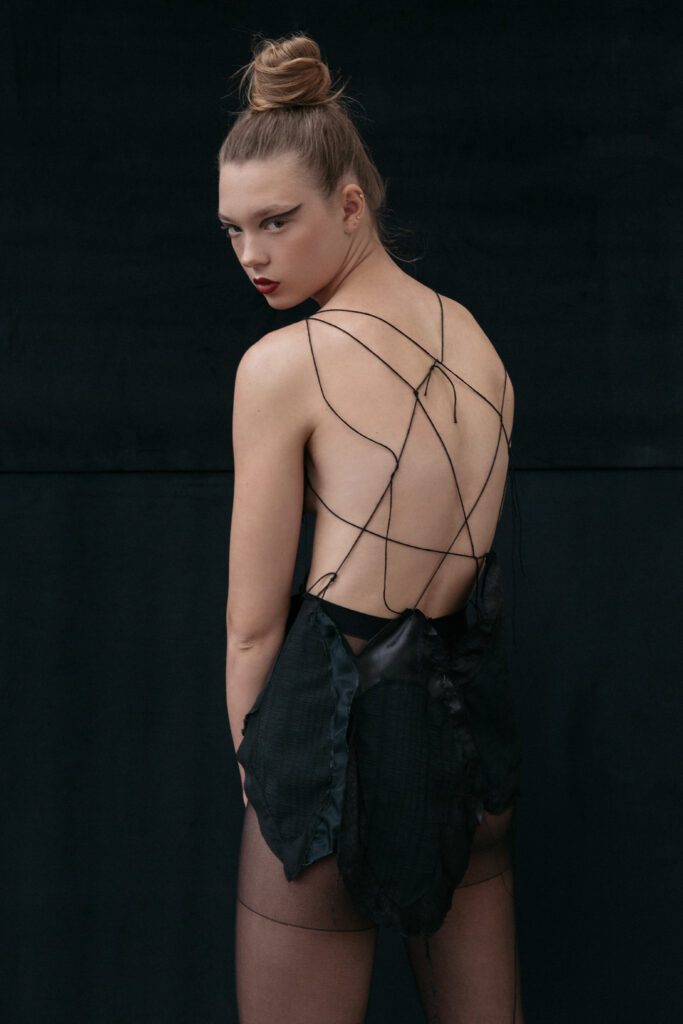
The Road Ahead
FAB: What does fashion mean to you?
Monika Mandac: Fashion is a form of expression because, with it, you can express literally everything. We had this study at the university, and we were talking about the statement we make about our clothing. When you see someone on the street, you see what they’re wearing and what they are representing, and you can actually get a lot of information about that person just by seeing what they’re wearing.
I really like to think of fashion as something that can be really powerful. It’s a tool for expression, for making a statement, and for also changing people’s minds. You don’t even have to say anything. You can just wear something and stand for what you believe in. It’s really powerful. I think it’s not just about making clothes and wearing them, but also about what you’re saying through them.
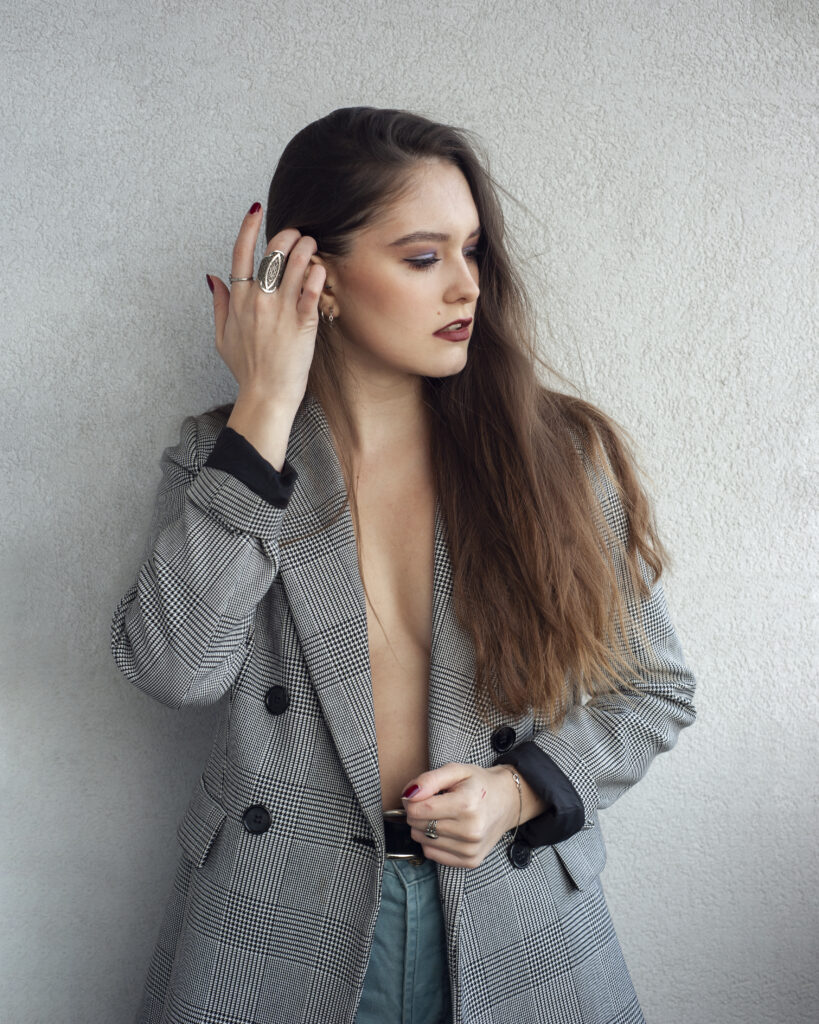
FAB: What’s your next step?
Monika Mandac: This is the part of my life where I told you that I do not have a precise goal. The first thing I know I want to do is start a brand from scratch. It’s hard when you’re a local designer and you’re not just building an online brand. You’re a brand that wants to have a relationship with the community. It’s a bit tricky. For now, I have been sewing and working in my room. The next step for me is to have an atelier and go full-time. For now, I have a job. (Laughs) You have to have a clientele base to cover your costs and all. This year, I want to go again to Fashion Lives. I want to continue for a little while in this genderless fashion and try to have more collaborations with other designers so we can make a really amazing community and support each other. I just really want to start creating more because I have a feeling that it’s been hard to manage time with work. I have a gazillion ideas for the creations, and they need to come out. That’s the priority for me right now. I have to think about everything and start making it a possibility.
Fun Zone: #FabFastFive
- FAB: If you could be any animal in the world, what would you be?
Monika Mandac: Horse
- FAB: What’s the one movie that you can watch over and over again?
Monika Mandac: Proposal
- FAB: While growing up, what was your favourite subject?
Monika Mandac: Fashion Illustration
- FAB: What is the easiest way to make you laugh?
Monika Mandac: Give me a compliment.
- FAB: What is your favourite colour in your closet?
Monika Mandac: Black


